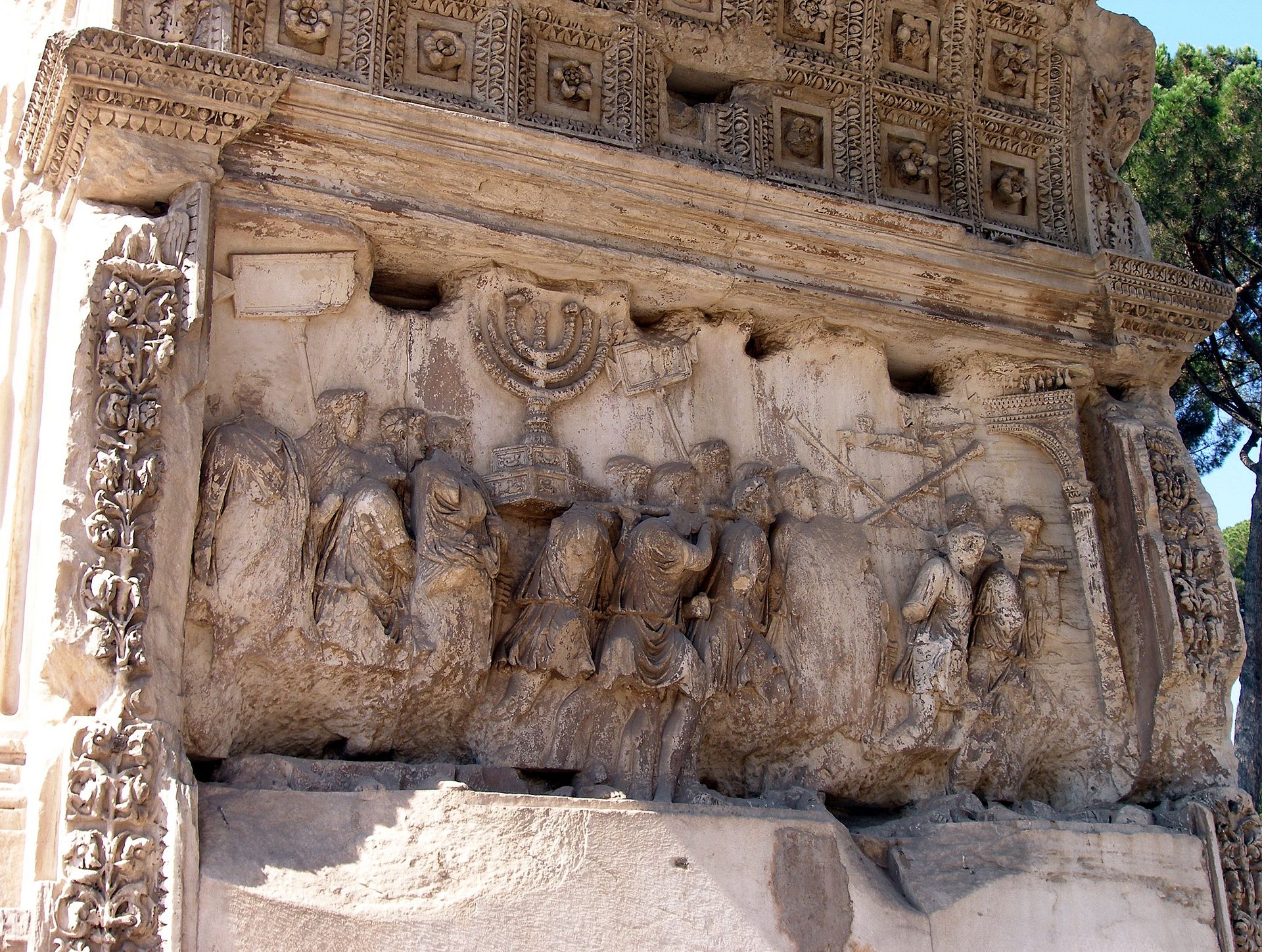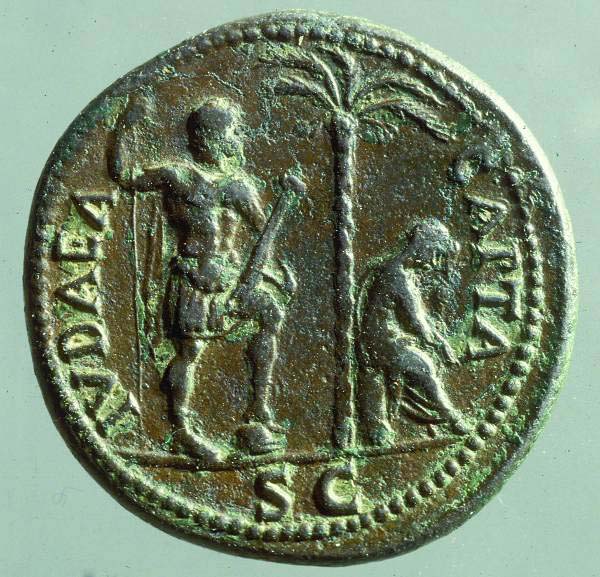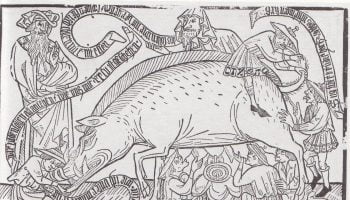Part XXI in our ongoing series on Race, Racism and the Middle Ages. You can find the rest of the special series here.
Holocaust.
The word is synonymous with the worst inclinations of the human race: horrific death camps, genocide, and a hatred that spared no Jewish man, woman, or child living under the Nazi regime.
Some think that violence against Jews was contained to this single event, carried out by a rogue leader for a few terrible years in the distant past. Few people realize just how long anti-Semitism, and the violence that comes with it, have endured. But violence and angry rhetoric against Jews have existed for millennia, prevalent not only throughout the Middle Ages, but well before it.
In 2017, anti-Semitism is on the rise again across the globe, and it isn’t enough to remember one awful moment in human history. We have to examine the deep, long-ranging pattern of anti-Jewish hatred across the centuries: the people who suffered, the people who resisted, and the fanaticism, paranoia, and petty political agendas that have always allowed it to persist.
The Ancient Roots of a Modern Problem

A 2016 article in The New Statesman titled “The Longest Hatred” traces the origins of anti-Jewish discrimination to the rise of Christianity. But in fact, anti-Jewish rhetoric and violence have a far longer history, beginning in the pre-Christian ancient world. Many of the still-persistent stereotypes about Jews were invented to slander their resistance to polytheism, emperor-worship, and the colonizing endeavors of ancient empires.
In the first century CE, the Jewish scholar Josephus wrote Contra Apionem, in which he collected and refuted several examples of anti-Jewish rhetoric in ancient philosophy. Some of this rhetoric was sparked by conquest of, and rebellion by, the Jewish people—in Egypt, for instance. Other examples come from a few Greek philosophers who were agitated by the spread of Judaism. The texts Josephus is responding to are (perhaps thankfully) lost to us, but seemed to have been diffuse, scattered, and limited to individual writers.
It would be Roman writers, and the Roman state, who fused anti-Jewish sentiments into a unified political doctrine. That very doctrine has undergirded the long-lasting entanglement of ethnic and religious hatred that is central to modern-day anti-Jewish prejudice.
Our records begin with Cicero. Known as one of Rome’s greatest orators, lawyers, and writers, Cicero is also considered one of the founding fathers of anti-Jewish rhetoric. This is thanks to his writing in Pro Flacco, a legal defense of one of his clients. While defending L. Valerius Flaccus, who was governor of Asia, from charges of corruption and embezzlement, Cicero attacks the Jews. He blames them for conspiracies against his client and demeans Jewish religious customs as
“very much at variance with the splendor of this empire and the dignity of our name and the institutions of our ancestors.”
He also suggests that despite Jewish resistance to the Roman conquest of Jerusalem,
“the gods showed how little they cared for this people, suffering it to be conquered and made a tributary.”
Cicero’s insults against Jews, which represent a minor portion of a long speech, had rather cynical motivation: one of the charges against Flaccus was that he had diverted the tributes that Jews sent to the Temple in Jerusalem into his own coffers. The alleged ‘misbehavior’ of the Jews under Flaccus’s governance was likely resistance to his criminal activities. But the Jews, as they so often would throughout history, served as a convenient scapegoat.
Pious Romans and “Superstitious Foreigners”
Cicero uses an important phrase to describe the Jewish religion. His phrase stems from a common xenophobic Roman concept, one that would become foundational for future anti-Jewish rhetoric.
That phrase is “barbara superstitio.”
Barbara superstitio does not translate into ‘superstitious barbarians’ as easily as you might think. To understand the insult, you have to grasp its opposite: the ancient Roman concept of pietas. Pietas is a more complex concept than our modern religious idea of “piety”; it required duty and loyalty to the gods, to family, and perhaps most of all, to Rome itself.
Rome’s commitment to its deities—particularly after the emperors were made into gods—was inextricable from Roman patriotic duty. Thus, superstitio was considered not just sacrilegious, but specifically anti-Roman; it made a person an enemy of the state. Meanwhile, barbar, taken from the Greek barbaros, meant “foreign,” though it could carry connotations of the primitive. Thus the phrase barbara superstitio, when attached to the Jewish religion, renders both the faith and its followers unpatriotic, sacrilegious, backwards, and alien.
Cicero’s anti-Jewish views—or perhaps, as some speculate, the performance of such views on behalf of his client—were unusual for Romans at first. In Cicero’s time, Jews living Rome were relatively protected and were permitted to practice their religious customs, such as observing the Sabbath. But Cicero’s arguments against the Jews would eventually catch on, especially when Rome needed them to promote a bellicose agenda. A century later, when Rome besieged Judea, the seeds Cicero planted flourished into a full, and poisonous, propaganda campaign.
The Jewish Revolt

In the first century CE, Judea rebelled against its Roman conquerors. The local, Roman-installed governors had confiscated money from the Temple and had allowed their cronies to plunder Jerusalem. Though the rebellion was centered on Jerusalem, it spread throughout the Middle East. Roman efforts to reclaim these lands took years, beginning with Emperor Nero and lasting well into the reign of his successor, Vespasian.
Vespasian allowed his son (and future emperor) Titus to lead the army in an infamously brutal siege on the city. Graphic accounts of the Jerusalem siege include Titus starving the Jews, burning a temple with Jews trapped inside, slaughtering between 600,000 to 1.1 million Jews, and selling the rest into slavery.

The conquest of Judea was deeply important to the Roman Empire’s dreams of world dominance and, hence, its image of itself. Titus took the golden menorah from the Second Temple as a trophy—an event immortalized on the Arch of Titus, which still stands in Rome today. Crushing the Jewish rebellion was considered such a triumph that Rome even issued commemorative coins to celebrate its victory.
The Roman Empire often made state violence palatable to its citizens by eviscerating its enemies in propaganda as well as on the battlefield. Master Roman propagandist and historian Tacitus provides a window into the way Rome weaponized anti-Jewish xenophobia to justify the attack on Judea. Tacitus’s Historiae (written in CE 70) begins by providing multiple theories about the origins of the Jews. The one he seems to prefer is that Jews were refugees from Crete who fled when Saturn was “driven from his throne” by Jupiter. He speculates that “the primitive elements of their religion”—the dietary restrictions and the holy significance of the number 7— might be attributable to their prior worship of Saturn.
It is clear, however, that associations with a Roman god did not save the Jews from Tacitus’s vicious pen. He calls Jewish customs “base and abominable” and elsewhere, “preposterous and mean.” His anger stems from Jewish resistance to Roman religion, including the emperor worship that had become entangled in Roman pietas after the death of Julius Caesar. For instance, as Tacitus writes:
“…when the Jews were ordered by Caligula to set up his statue in the temple, they chose rather to resort to arms.”
Tacitus doesn’t just demonize the Jews for rejecting Roman religion; he also targets them as a “race” that is “hateful to the gods,” laying the groundwork for an anti-Semitism that consistently conflates race and faith. Moreover, his screed against the Jewish people resounds with some painfully familiar anti-Semitic stereotypes.
The Roman Pillars of Anti-Semitism
- Jews are wealthy.
Tactius suggests that Jews prosper by becoming a magnet for the rejected races of the ancient world. He argues that,
“The worst rascals among other peoples, renouncing their ancestral religions, always kept sending tribute and contributions to Jerusalem, thereby increasing the wealth of the Jews.”
This implication that Jews have, and care about, other people’s money is entangled in Roman colonial custom: colonized lands were forced to pay tribute (i.e., taxes) to Rome for the privilege of being governed by them. For Jerusalem to take tributes that could have gone to Rome, if this allegation was even true, would be a slap in the face to their Roman conquerors.
- Jews are cliquish and perverse.
“They sit apart at meals, and they sleep apart, and although as a race, they are prone to lust, they abstain from intercourse with foreign women; yet among themselves nothing is unlawful. They adopted circumcision to distinguish themselves from other peoples by this difference. Those who are converted to their ways follow the same practice, and the earliest lesson they receive is to despise the gods, to disown their country, and to regard their parents, children, and brothers as of little account.”
Note Tacitus’s implicit invocation of pietas to levy these insults: not only does he falsely claims that Jews reject the very foundation of Roman morality—the patriotic trinity of state, gods, and family—but he also claims that Jews seduce other people into doing the same, as though their religion were a contagion.
In addition, he conjures up a fantasy of deviant sexuality among Jews. This is a frequent Roman trope used to destroy a victim’s credibility—in fact, this is how they slandered Cleopatra. But the difference here is that Tacitus attaches “perversion” to an entire race, making it sound as though aberrant sexuality is an inherent racial quality.
- Jews are out-breeding “real” Romans, probably on purpose.
Despite his assertion that Jews are essentially eternal foreigners who want to be left alone, Tacitus feeds on a common Roman fear that foreigners will grow to outnumber “true” Roman citizens by asserting that Jews
“…take thought to increase their numbers; for they regard it as a crime to kill any late-born child, and they believe that the souls of those who are killed in battle or by the executioner are immortal: hence comes their passion for begetting children and their scorn of death.”
Despite the fact that many Jews were born and raised in Rome, Tacitus portrays them as a racial Other, an ‘alien’ group that threatened to destroy the nation by replacing its ‘real’ people. Americans are used to this kind of hysteria about “foreign babies” among racist politicians, but they may not realize that this paranoia went all the way back to the ancient world. (It is, perhaps, worth noting that the Roman people—if not the Roman Empire—seem to have survived that looming demographic winter intact.)
- Jews practice sacrilegious rituals.
“The Jews regard as profane all that we hold sacred; on the other hand, they permit all that we abhor.”
Although nearly all ancient religions practiced animal sacrifice, Tacitus asserts that Jewish sacrifices are specifically designed to degrade and offend other religions. He describes them “sacrificing a ram, apparently in derision of Ammon” and adds,
“They likewise offer the ox, because the Egyptians worship Apis.”
Steeped within Tacitus’s accusations against Jews are assertions not just of their difference, but of their malice. The mythology he creates around the Jewish people paints them as perpetual corrupters, luring people away from their religions, their families, and their patriotic duties on purpose, as though Jews had a singular devotion to destroying all civilizations but their own.
Cracks in the Foundation
Tacitus’s complaints that Jews are naturally opposed to pietas had another motivation besides the war in Judea. Tacitus was one of the quindecimviri sacris faciundis: a group of men who oversaw foreign religions in Rome. In the time that Tacitus was railing against Jews, Roman pietas had serious competition from ‘foreign’ faiths, which were increasingly attracting Rome’s cosmopolitan citizens. So Tacitus’s anti-Semitism isn’t just aimed against Jews in Judea: he is also targeting Jews who live in Rome.
And increasingly, the Roman Empire targeted Jewish Romans and their religious freedom as well. In the first century CE, Roman citizens were forbidden from practicing Jewish customs. Jews, though they had some rights in Rome, were not allowed to be citizens, and any Roman citizen caught practicing Judaism was charged with “atheism”—which could carry a death sentence.
Christians in Rome would be targeted by the Empire for some of the same reasons. But when Christianity became Rome’s official religion, it absorbed the Roman state’s position against barbara superstitio as its own. During the latter years of the Empire, Rome would promote some of the very same religious conspiracy theories against Jews that were once used against Christians themselves. Ancient rhetorical devices against Jews that accused them of being untrustworthy, isolationist, corrupt foreigners merged with new accusations that designated Jews as scapegoats for the death of Jesus Christ. This would eventually form an even more pervasive, violent, and destructive anti-Semitism that spread throughout medieval Europe, pervaded the Renaissance Inquisition, and reached a horrifying peak in Nazi Germany.
Never Forget

Perhaps ironically, people who aware of the long lineage of anti-Jewish rhetoric today are not always allies in the battle against it. For example, Cicero and Tacitus are both popularly quoted in neo-Nazi forums. The Daily Stormer posts articles about “The Roman Empire’s Jewish Problem.” Neo-Nazis even use ancient Roman testimony to argue that anti-Semitism isn’t religious discrimination, it’s ethnic, which—in their warped view—makes it justifiable.
To this day, ancient writers have a sort of intellectual cachet; we tend to see them as unusually enlightened—often more than they deserve. We forget that, like many modern politicians and rhetoricians, Romans had selfish agendas. They were more than willing to sacrifice the safety of a resistant, rebellious group of people if it would earn them power, wealth, or the favor of fervent supporters.
Today, anti-Semitism is more often encoded as screeds against “global powers,” “globalist media,” or “international bankers” than blatantly trumpeted in outright Holocaust denial. But anti-Semitism remains a tool employed by the powerful to gain power and influence, and to rile up the angry masses for their own gain. This is one truth that, particularly in our “post-fact” environment, we must never, ever forget.
The Public Medievalist does not pay to promote these articles, so we would love it if you shared this with your history-loving friends! Click to share with your friends on Facebook, or on Twitter.





Comments are closed.